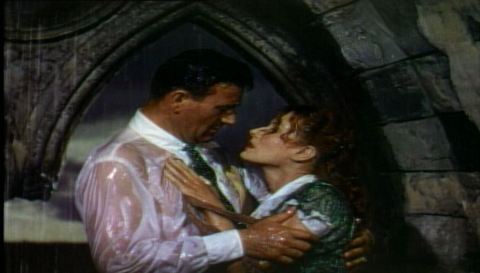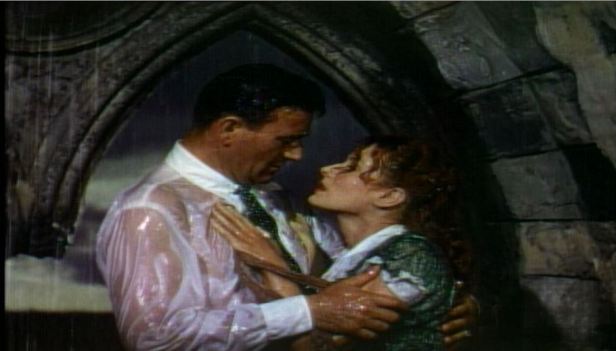To some of you, the year this movie was made, 1952, would make it completely and without question, unwatchable.
Pity.
The Quiet Man is like a letter from a loved one, a letter that you never tire of reading. For you People of Youth, a letter is like an email that is printed out and mailed. Mail is how you receive electronics you buy from Amazon or Newegg. But instead of a box, a letter would come in an envelope.
This is a movie that demands to be listened to. It must have your undivided attention to be truly appreciated. Most movies made today are for audiences with Attention Deficit Disorder. They have to be able to text during the movie, share their text with their BFF, use the bathroom, and still not lose track of the plot. The Quiet Man is definitely not made for today’s average movie audience.
But you’re better than that, I know you are. How do I know? You’re reading my blog, are you not? You are so far above average, that to you average looks like this: ![]() At least, I know you CAN be. Try this: watch the first 6 minutes of this movie, and pay attention. Do not talk. You can smile, chuckle, laugh, you can even slap your knee. But if after 6 minutes you are not enthralled, well, what can I say. At least I tried to help you.
At least, I know you CAN be. Try this: watch the first 6 minutes of this movie, and pay attention. Do not talk. You can smile, chuckle, laugh, you can even slap your knee. But if after 6 minutes you are not enthralled, well, what can I say. At least I tried to help you.
The Quiet Man tells the story of Sean Thornton (John Wayne), an American who has traveled back to his birthplace, Ireland. He hopes to buy and live in the house of his birth, in an effort to escape his past. His goal becomes complicated when he meets Mary Kate Danaher (Maureen O’Hara), the beautiful sister of Will Danaher (Victor McLaglen).
Those three leads would be enough reason to watch this film. But add a dozen other charismatic actors, an amazing script by Frank Nugent (Fort Apache (1948), She Wore a Yellow Ribbon (1949), Mister Roberts (1955), The Searchers (1956)), and the perfectly-paced direction of John Ford (Fort Apache (1948), She Wore a Yellow Ribbon (1949), The Searchers (1956)). Notice something there? Great directors do not achieve greatness by accident. They know who to make movies with.
The chemistry between Wayne & O’Hara is palpable, a joy to watch. It’s a testimony to that chemistry, and to Ford’s confidence in it, that the most romantic sequence in the film, as they go walking on their first date and get caught in a thunderstorm, has no dialogue.
But throughout the rest of the film, the dialogue is a wonder. Lines such as:
Train Conductor: Do ya see that road over there?
Thornton: Yeah.
Train Conductor: Well don’t take that one, it’ll do ya no good.
Michaleen (Barry Fitzgerald): Married? Not likely that one, and her with her freckles and her temper!
Will Danaher: He’ll regret it till his dyin’ day, if ever he lives that long.
Will Danaher (speaking to Thornton): Your widow, me sister, she could’ve done a lot worse, poor woman.
Of course, for the lines to be truly appreciated, they must be heard as they are spoken, by the talented cast in their charming Irish accents.
In the commentary track of the DVD, Maureen O’Hara says: “The terrible thing is that every so often I hear the film, and I stop to listen when I should be telling you stories, but I can’t help it.”
Totally understandable. So shut off your phone, watch this movie with people that know how to watch a movie, open your eyes wide and listen.


You got it Pip. I loved this movie. If real romance lived up to this we’d all be dead by your age. Excuse me I’m going to go to ‘Search’ on Roku – POP
PS: I got SHANE after you wrote about it and was baffled by a different ending. Know what gives there?
Is this what you’re talking about? From IMDB – “Joey calls out, ‘Shane! Come back!’ But Shane continues on past the gravestones on Cemetery Hill, riding toward the mountains until he disappears into setting sun. [NOTE: In some versions, Joey calls out a final ‘Bye, Shane!’]
Yeah, Joey goes toward the back of the house and hollers out about once “Shane, come back Shane. My memory might be off, but I remember him going to the front of the house and Shane is riding off and he hollers over and over SHANE, COME BACK! COME BACK SHANE! SHANE! come back…
Main point is , it wasn’t quite as heart wrenching and effective.